School feeding in Senegal brings the wider community into the mix
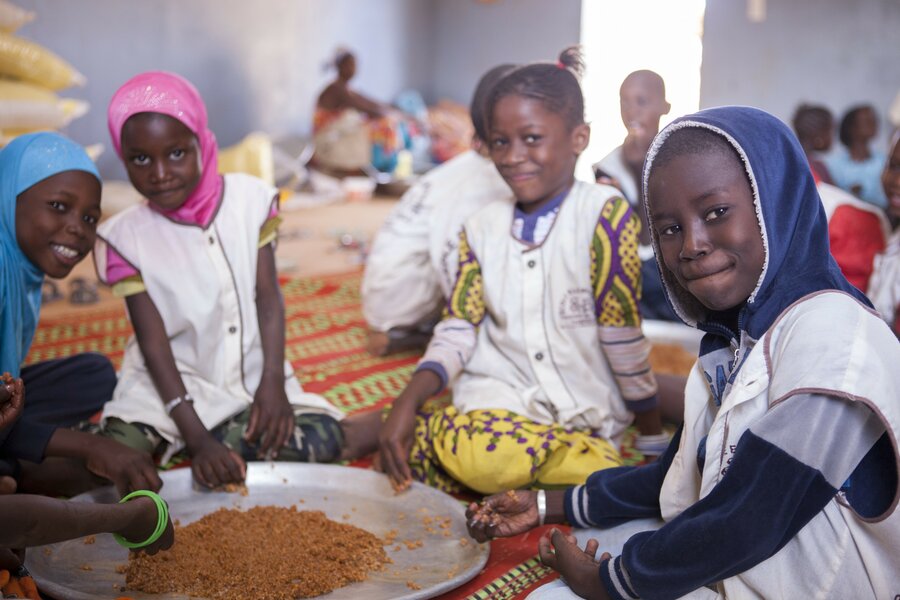
By Lena Savelli
Morning's barely broken when women start arriving at the primary school in Saré Bidji, an arrondissement in the southern region of Kolda in Senegal — plastic jerry cans, filled to the brim with water, balanced on their heads. Despite the unearthly hour, they are already engaged in lively conversation.
Some carry firewood, collected around the village, tied together in bundles with a string. Others bring small bags of tomato paste, dried fish or peanut sauce — condiments which will soon be placed in a big pot with rice, beans and oil to make today's meal for the 305 children who attend the school.
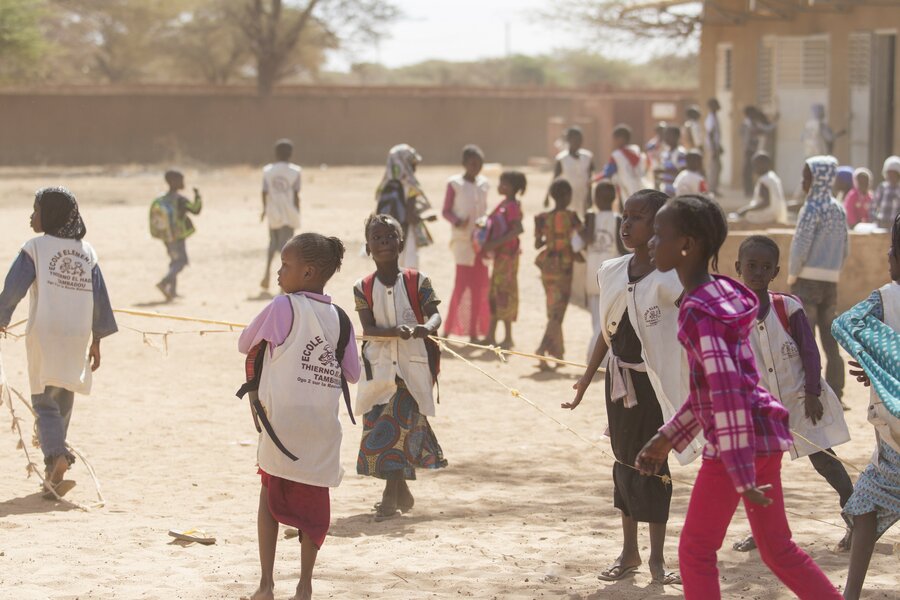
When I first started visiting school feeding activities in Senegal in early 2018, as WFP Country Director there, one thing that struck me was the mobilizing power of the school feeding programme. I would watch in awe as the mothers, grandmothers or aunties each chipped in with their time, effort or in-kind contributions to prepare plate after plate of local delicacies such as yassa poulet, thiebou diene or mafé.
Such eagerly awaited meals inspired parents to send their kids to school and the children, in turn, to perform better in class. In providing support to organize school management committees and training on hygiene, food preparation and nutrition, WFP has sustained the engagement.
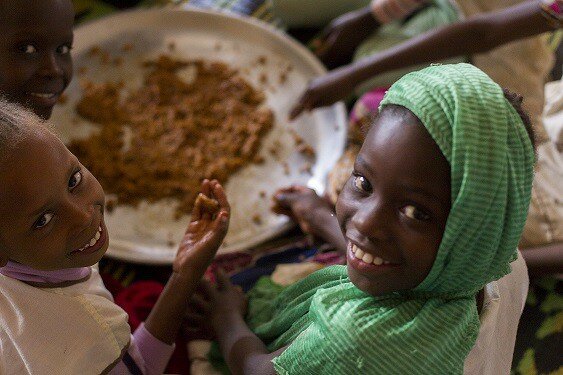
In Foundiougne, which I visited a few months later with the Minister of National Education, I witnessed how this force for good could transcend the family and school to mobilize the whole community. In this small town, nestled on the banks of the Sine-Saloum River in the central region of Fatick, the mayor and local school officials worked together to make land available to local communities to cultivate so they could replenish the school canteens with cereals and pulses.
According to Matar Diassé, a local official, such school granaries, or community fields, take "a community, participatory, inclusive and proactive approach" to create a sustainable and independent food supply for the elementary schools in the locality. Mobilizing the community to do the work did not prove difficult, he added.
The dramatic increase in school enrolment and improved grades that result from school feeding speak for themselves. The initiative has now spread to other parts of the country, as more local officials buy into it. WFP has provided support by helping local communities in five regions establish "model canteens" that pilot projects such as community fields, chicken rearing, vegetable gardens and biodigesters.
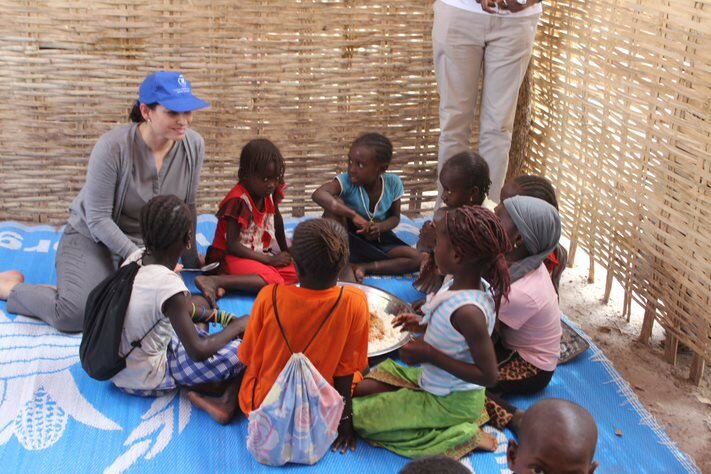
A way of demonstrating the positive impact of school feeding, the model canteens help mobilize the community while promoting nutrition-sensitive and environmentally sustainable methods and boosting local production.
But school feeding has not only engaged actors at grassroots and regional levels. WFP Senegal has embarked on a comprehensive and innovative advocacy campaign, aimed at rallying national commitment. In November 2019, the Group of Friends of School Feeding in Senegal was created, an informal advocacy network that attracts mainly Senegalese personalities from the world of sports, political life, culture, entertainment and diplomacy.
Luminaries such as former Senegalese Minister Ndioro Ndiaye, the Secretary-General of FIFA,Fatma Samoura, the recording artist Carlou D and NY-based celebrity-chef Pierre Thiam, now regularly advocate for school feeding. Whether at a hip-hop concert, in the National Assembly, at youth gatherings, art fairs or in political party conferences, school feeding is now being widely discussed in Senegal. The simple economic argument is powerful — for only 20 cents a day, you can have a transformative impact on the health, nutrition, education and gender equality of children and their communities. Who wouldn't want to mobilize for such a cause?
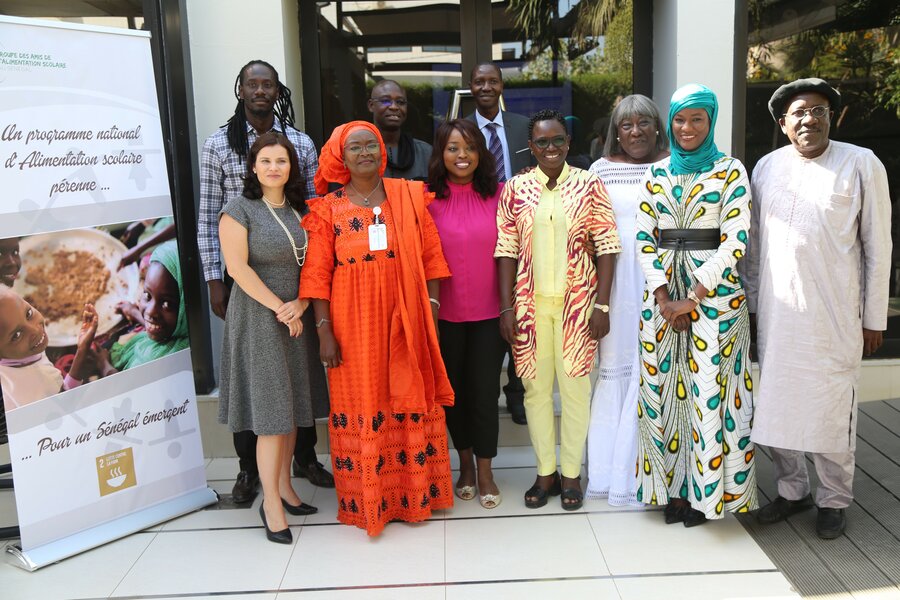
Perhaps the strongest supporter of school feeding in Senegal can be found in the Presidential Palace in downtown Dakar. Re-elected for a second term in February 2019, President Macky Sall has pledged to launch a national school feeding programme targeting rural and peri-urban areas this year, in the wake of advocacy by WFP and the Ministry of National Education.
When at full scale, this programme would expand school feeding from its current coverage of less than a quarter of schools, to more than 65 percent of primary school children in Senegal — a dramatic increase which would benefit more than one million children.
The Government of Senegal is now acting on school feeding across Ministries; whether concerned with agriculture, health, education, gender or social protection, the power of the school meal is engaging all. WFP has been requested to work with the Ministry of National Education to develop the operational plan for the national programme and lead its implementation. So when we celebrate International School Meals Day on 12 March, and organizations and governments across the world express support for school feeding, I can't help but think of the women of Saré Bidji.
As they get on with the task of cutting onions and washing rice for the lunch, these women can feel proud in that they were pioneers in recognizing the importance of such a simple thing as a free, warm, daily meal for a school child. Through their engagement and the mobilization of the whole of Senegalese society, school feeding will continue to be a regular feature of the lives of their children in the future. Such is the mobilizing power of school feeding.
Lena Savelli is WFP Country Director and Representative in Senegal
